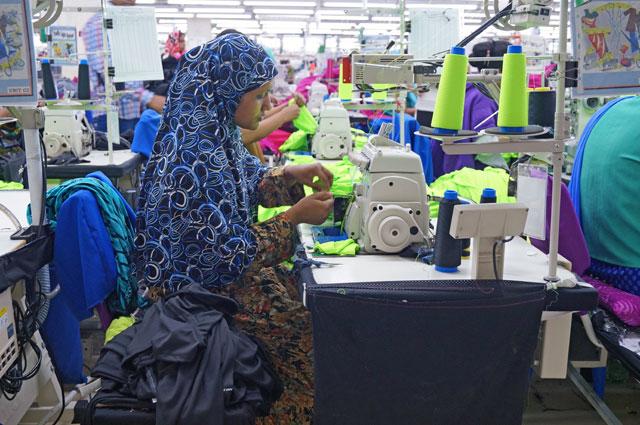You are here
On International Migrants Day, activists urge more attention to rights of guest workers
By Laila Azzeh - Dec 17,2016 - Last updated at Dec 17,2016

A guest labourer works at a textile factory in Irbid, 80km north of Amman, recently (Photo by Rajive Cherian)
AMMAN — Jordan joins the world today in observing the International Migrants Day with tremendous challenges as the number of illegal guest workers continues to rise, along with the influx of refugees, according to civil societies.
With an estimate of 700,000 illegal guest labourers working in informal economic sectors, the Phenix Centre for Economic and Informatics Studies underlined the need to adopt comprehensive national policies that are in line with the principles of human rights, equality and justice.
According to figures cited by the centre’s director, Ahmad Awad, there are 1 million guest workers in Jordan and only 315,000 of them are registered at the Ministry of Labour.
Egyptians top the list of guest labourers, followed by Syrians.
“Although Jordan has not endorsed the International Convention on the Protection of the Rights of All Migrant Workers and Members of their Families, there are a number of laws and regulations that govern guest workers, such as the human trafficking, social corporation and labour laws,” said Awad.
On the other hand, he stressed the need for developing a “justice policy to manage the guest workers issue in Jordan that takes into account the interest of national and migrant labourers alike”.
“For example, the decision to raise the minimum wage should also include non-Jordanians. Domestic workers have the right to benefit from social security,” Awad highlighted.
According to the 2016 Global Slavery Index, around 42,900 people are living in “modern slavery” in Jordan today, up from 31,000 cited in its 2014 report.
The Tamkeen Fields for Aid organisation said that although Jordan was one of the first Arab countries to enact laws that protect guest workers, “failure to apply them has made them lose their value”.
“Guest labourers in general — and illegal migrant workers in particular — face many violations that should be addressed in line with human rights,” said Tamkeen in an e-email sent to The Jordan Times on the occasion of International Migrants Day.
The NGO called for joining the International Convention on the Protection of the Rights of All Migrant Workers and Members of their Families and activating inspection campaigns, including in houses that employ domestic helpers.
The Labour Ministry allows employers to hire guest workers in jobs that are not demanded by Jordanians and according to ratios set with the business owners and their representatives.
The ministry conducts inspection campaigns around the Kingdom and takes legal measures against employers who commit violations, which include a fine of between JD200 and JD500, referral to court, and issuing warnings to rectify their legal status.
Moreover, if the status of guest workers is not rectified, the ministry closes the institution and does not allow it to reopen until it rectifies its status.
In addition, ministries and public institutions are not allowed to employ guest workers for cleaning or food services.
The IOM, the UN Migration Agency, calculates that one in every seven people “on our planet” is a migrant — someone living, working and starting a family somewhere other than his or her habitual place of residence, said William Lacy Swing, IOM director general.
“And, even though so many are just trying to live, too many are dying,” Swing continued.
“There is a real demographic revolution going on today and it is up to us to manage it for the benefit of all. Most migrants simply want an opportunity and would welcome even a temporary one — say, a short-term student or agricultural work visa — to improve the lives of their families back home,” the official said in a message released on the occasion.
Related Articles
Although the Kingdom is not a signatory to the International Convention on Migrant Workers, it has several laws that regulate migration and rights of migrant workers, according to the Phenix Centre for Economic and Informatics Studies.
Tamkeen for Legal Aid and Human Rights has urged the Labour Ministry to ease procedures for guest workers to rectify their status.
AMMAN — Guest workers will not be able to change their workplace before their work permits expire under new regulations issued by the Labour











